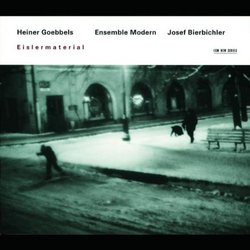| All Artists: Heiner Goebbels, Hanns Eisler, Ensemble Modern, Josef Bierbichler Title: Heiner Goebbels: Eislermaterial Members Wishing: 3 Total Copies: 0 Label: Ecm Import Release Date: 11/5/2002 Album Type: Import Genres: International Music, Jazz, Pop, Classical Styles: Europe, Continental Europe, Avant Garde & Free Jazz, Vocal Pop, Chamber Music, Historical Periods, Classical (c.1770-1830), Modern, 20th, & 21st Century Number of Discs: 1 SwapaCD Credits: 1 UPCs: 028946164822, 0028946164822 |
Search - Heiner Goebbels, Hanns Eisler, Ensemble Modern :: Heiner Goebbels: Eislermaterial
 | Heiner Goebbels, Hanns Eisler, Ensemble Modern Heiner Goebbels: Eislermaterial Genres: International Music, Jazz, Pop, Classical
|
Larger Image |
CD DetailsSimilar CDs |
CD ReviewsWonderful hommage/assemblage,heavy at times scarecrow | Chicago, Illinois United States | 10/30/2003 (5 out of 5 stars) "Hanns Eisler was like the Schubert of the 20th Century his terse, penetrating and impassioned songs were literally sung by millions. He was the neglected(unacknowledged) "third" student of The Schoenberg School of Dodecaphonic Music, one he never recognized until they both lived in exile during WW2 in Los Angeles, Politics had changed Schoenberg's life involutarily and the two creators mended fences.It was difficult Schonberg once a member of the Army of Vienna fighting for national bourgeois rights, to Eisler's Marxism.The objection to politics and music persists well to today, I recall how Berio had no use for Eisler's political affinity as well,that his art was "simpleminded" perhaps, Berio had rendered the avant-garde as a conceptual dilution in many respects,a simple minded affair(his Sinfonia) despite Berio's profound affinity for the buzz of the Sixties rebellions always taking the easy path of the implications of the post-Webern aesthetic. perhaps something more profound was obtained with post-serial renderings.Eisler was well read and consciously turned his back on the aesthetics of the century,a famous quote was that if it is possible only to know one, (either politics or music) the fact remains that one comes to know neither.A hommage to Eisler can only be known in this fascinating assemblage-like durational plan of Goebbels. That of simply utilizing directly Eisler's famous Songs,Orchestral and Chamber music as "materials", a concept from Heiner Muller(the heir/apparent to Brecht), whom Goebbels has worked with.So the musical plan is really arbitrary,as long as the Eisler's deep moments are affirmed, as the Songs.I thought the accompaniment was a bit heavy at times, not really fully acknowledging Eisler subtle use of simplicity,directedness,and threadbare textures to convey weighted text, as the "Lullabys". Eisler was an economical composer nothing was ornamental or extraneous to his aesthetic.He preferred to comment on the emotions rather than convey them.Goebbels the use of the brass,(an Eislerian timbre)the tuba has incredible weight.And at times it is too much. These "Vier Wiegenlieder"(Lullabys) are something quite gentle,private and introspective.Brecht's text frequently allows the mother to address her child reflecting upon a past and future reality. I think this high,heavyhandedness persists thoroughout the entire hour here. There is also impassioned playing from the Ensemble Modern, avant-garde like timbres, fluttetonguing,wind harmonics, multiphonics, that is all part of the commmentary of this "assemblage/hommage".Likewise within the Song "Mutter Beimlein", who walked with a wooden leg,I once heard the accompaniment(originally for piano solo) simply with voice and Bass Clarinet. Here Goebbels summons the Tuba again to play this loop like rhythm that suggests the particular "limp" of Ms.Beimlein., quite unassuming and beautiful with a dignity. Again this was Eisler's genius to suggest the greatest lifeworlds with the barest of musical means.I like the idea of utilizing excerpts (materials) from the Orchestral pieces,a deconstruction of sorts, these are seldom heard even today, and toward the end Goebbels finds Eisler's "String Quartet", a never published work along with a Bb Clarinet Solo to excerpt. The singing, all of it by Josef Bierbichler is dark enough and forceful enough but the absence of women,makes this hommage rather one-dimensional, their dark viola women timbres are necessary to convey the darker complex moments of the Eisler/Brecht materials. There is then "Hoerstuck"in two parts,as interruptions of the musical flow of Eisler's interview with Hans Bunge, that had initially inspired Goebbels to make Eisler a lifelong mentor. The Master's voice is always useful surrounded by his music. The overall effect here is like leafing through a newspaper, idly stopping at points, accelerating in others." Incredible OT | New York, New York USA | 02/07/2004 (5 out of 5 stars) "I discovered this work by coincidence while listening to WNYC. A 20th century German experience tour de force. What powerful work. All structure coordinated brilliantly, original in extracting certain sounds within a rigorous classical framework. Very animated, descriptive, alive and organized. A small minus are some spoken conversations. But beautiful and passionate vocals and inspiring overall. Comes with a booklet where you can read Eisler's poetry in German and English. Really great work, I have been listening to this for a year now and every time it is inspiring." Masterpiece Corrado Beldi | Jazz Critic, Milano, Italy | 01/09/2004 (5 out of 5 stars) "Heiner Goebbels rilegge l'opera e le opinioni di Hanns Eisler, maggiore compositore della DDR e collaboratore di Bertold Brecht per tante magnifiche folk songs (tra cui la meravigliosa "Festlied der Kinder", inno nazionale della Germania Orientale). Un disco di pura archeologia musicale, in cui suoni registrati e vecchie testimonianze radiofoniche di Eisler si stratificano alle esecuzioni di Ensemble Modern (il gruppo con cui Frank Zappa incise "The Yellow Shark"). Con la splendida voce di Josef Bierbichler. Mio personale disco dell'anno (scusate il ritardo).
Arthur Cravan" |

 Track Listings (21) - Disc #1
Track Listings (21) - Disc #1